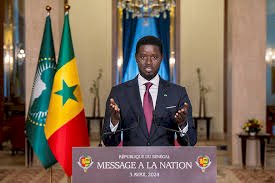Senegal president asks France to close military bases in the country
Faye also revealed that he received a letter from Macron acknowledging the Thiaroye massacre as a "massacre," describing it as a “great step” toward reconciliation.

Senegal’s President, Bassirou Diomaye Faye, has called for the closure of French military bases in the country, asserting that their presence is incompatible with Senegal’s sovereignty.
His statement comes as Senegal prepares to commemorate the 80th anniversary of the 1944 Thiaroye massacre, a notorious colonial-era atrocity.
Speaking to AFP on Thursday, November 28, Faye acknowledged French President Emmanuel Macron’s admission of responsibility for the massacre, in which French troops killed Senegalese soldiers who were protesting delayed wages after returning from World War II.
“Senegal is an independent country, it is a sovereign country, and sovereignty does not accept the presence of military bases in a sovereign country,” Faye said during the interview at the presidential palace.
Faye, who won the March elections on a platform promising to assert Senegal’s sovereignty and reduce dependence on foreign powers, emphasized that this move does not signify a severing of ties with France.
“Today, China is our largest trading partner in terms of investment and trade. Does China have a military presence in Senegal? No. Does that mean our relations are cut? No,” he said.
Senegal remains one of the few countries in francophone West Africa still hosting French troops, while neighboring Mali, Burkina Faso, and Niger have expelled French forces and turned to other international partners, including Russia, for security assistance.
French military presence in Africa has been undergoing significant reductions, with reports earlier this year indicating plans to scale back troops in Senegal to 100, down from 350.
Despite the call for the closure of bases, Faye noted that France remains an important partner for Senegal in terms of investment, trade, and the presence of French companies and citizens.
Faye also revealed that he received a letter from Macron acknowledging the Thiaroye massacre as a "massacre," describing it as a “great step” toward reconciliation. The incident, in which French forces opened fire on Senegalese soldiers demanding their rightful wages, has long been a source of contention between Paris and Dakar.
“I received today a letter from President Emmanuel Macron in which he acknowledges that it was a massacre, very clearly, unambiguously,” Faye said. Macron also apologized for being unable to attend the commemoration of the massacre’s 80th anniversary.
Faye indicated he is considering asking for a formal apology from France. “To recognize that a massacre has been committed must obviously have the effect of making amends. We think that naturally, this is what must follow,” he stated.
The commemoration of the Thiaroye massacre serves as a poignant reminder of Senegal’s colonial past and its ongoing efforts to assert sovereignty and demand accountability from former colonial powers.






















